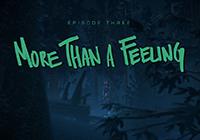Marvel's Guardians of the Galaxy: The Telltale Series - Episode Three: More Than a Feeling (PC) Review
By Olivia Falk  03.09.2017
03.09.2017

The Guardians are back once again with a new chapter of their adventures. After their painfully average first outing, things were starting to look up in episode two. The story began to branch out, the choices were more thought-provoking, and the characters, well, had more character. Sadly, this uphill trend doesn't seem to have carried over into episode three, which ends up suffering from several of the same issues that plagued the first episode.
The biggest issue with Guardians of the Galaxy - Episode Three: More Than a Feeling is that it's boring. Not throughout, mind you; an early flashback scene with Peter and the episode's ending are particular standouts. Otherwise, though, the narrative plods along, turning a couple of hours-long episode into something that warranted a "head clearing" break halfway through. It really feels like the Guardians of the Galaxy IP weighs it down, because it means that the game is constantly living in that series' shadow. Compared to the energetic, wisecrack-filled pace of the films, Telltale's game may as well be made of molasses. If this were an original sci-fi series, the glacial storytelling could be considered "just a part of the writing style". This is Guardians of the Freaking Galaxy, though, and when the most memorable line is Rocket referring to Thanos as a "great rolling turd", there's something seriously wrong.
There's also the issue of "unwelcome backstory". The episode tries to delve into aspects of the story that were brushed over previously, like Gamorra's early relationship with Nebula. In theory, this is a cool idea, but in practice, it takes all the mystery out of the events and replaces them with yet another QTE-laden action sequence. Apparently, all of those "super intense fights" between the two sisters just amounted to them fighting on a bunch of floating platforms in Thanos' lair. Exhilarating stuff. Compared to the touching sequence with Rocket and Lyla in episode two, this is a marked step down.

The reliance on flashbacks has another major detriment, though: it completely kills the core conceit of the game: choices matter. In that fight, it doesn't matter what actions are taken, because not only is it basically a hallucination, but even if it wasn't, the story has already established the outcome. It's obvious that no choices will change Nebula's present hatred for Gamorra, no matter how compassionate she acts. There's barely even the illusion of choice, because the results have already been clearly shown.
This lack of impact taints the entire experience. Failing vs. succeeding at QTEs frequently results in identical cutscenes. Some "big" choices (i.e. the ones where only two options are given instead of the usual four) literally change a couple of lines of dialogue or a single scene before the story snaps back on track. Certain actions are simply set in stone, and while being specific would delve into spoiler territory, there was one moment where giving a choice to deliberately fail a QTE would have made things much more interesting; instead, failing it just gives a game over screen.

Cubed3 Rating
Subpar
More Than a Feeling is not a bad game when compared to some of the other titles clogging the market. However, when compared to Telltale's other series, it fails, lacking the drama and heart that made many of them so endearing. When compared to the films that it draws inspiration from, it can't compete with the likeable cast, crackling dialogue, and exciting action scenes. Once again: if you want to spend two hours with the Guardians, you're probably better off watching one of the movies again.
Comments
Comments are currently disabled

 Sign In
Sign In Game Details
Game Details
 Out now
Out now  Out now
Out now  None
None  Out now
Out now  Subscribe to this topic
Subscribe to this topic Features
Features






 Top
Top

